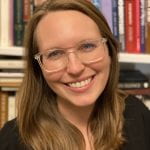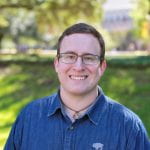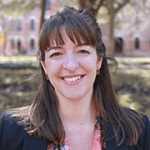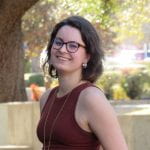We interrupt our Meet Your Graduate School Series to celebrate some special graduate students who have earned recognition for their excellence in various areas like research, teaching, and dissertating. Every year, the Graduate School recognizes several awards for Graduate Student excellence. In the Fall, there is the Research Showcase, where graduate students enter a research poster to compete for best submission in the Humanities, STEM, Social Sciences, and Crowd Favorite Categories. Then, in November, the Graduate School’s three most prestigious awards were conferred upon the 2021 and 2022 winners at the Graduate Student Award Luncheon, the Outstanding Graduate Student Instructor Award, Outstanding Graduate Student Research Award, and Outstanding Dissertation Award. Meet this year’s outstanding graduate students below to learn more about them, their awards, and their research. Congrats to all of this year’s winners!
Outstanding Graduate Student Instructor Awards (2021-2022)

Originally from Northern California, Katherine Goodwin received her BA in History from Humboldt State University (now Cal Poly Humboldt) and an MA in History of Christianity from Wheaton College. Now a PhD Candidate at Baylor, she focuses on the ways women have shaped the church and society through religious writing in late medieval and early modern England. Teaching at Baylor has been a highlight of the program for Katherine, as she loves finding ways of “making history matter” to students (especially non-majors). From survey courses to upper level classes, Katherine tries to bring students into the story of the past and help them understand how their current experiences fit into a longer history of faith, challenge, and change over time.

Cordell Hammon grew up in Midland, TX and, at an early age, discovered that he had two true loves: eating and learning. There aren’t a lot of careers focused on eating, so he pursued learning. Cordell eventually graduated from the University of Texas Permian Basin (where he met his lovely wife) with a double major in Computer Science and Mathematics. He fell in love with the beauty and profundity of Math and decided to pursue a graduate degree in the subject. Cordell started his career at Baylor in Fall 2018 and (if all goes according to plan) will graduate in Spring 2023. After graduation, Cordell will start a career in analytics at Capital One.

Maryann R. Hebda is a doctoral student in the Educational Psychology Department at Baylor University. She received her M.S. in Special Education-Gifted Emphasis from Emporia State University and B.S. in Elementary and Special Education from Nebraska Wesleyan University. Her research focuses on STEM talent development and achievement motivation in gifted and twice-exceptional populations.

Jose Seiba Moris is a PhD student in the Health, Human Performance, and Recreation (HHPR) department at Baylor. Jose completed his master’s degree at Southern Illinois University Edwardsville (SIUE), where he won the SIUE Graduate School 2020 Outstanding Thesis Award for his master’s thesis on the effects of the Male Athelete Triad (MAT).

Tyler Mowry is a doctoral candidate in the Religion Department whose research focuses on the development of the narrative books of the Hebrew Bible in light of the various manuscript witnesses. He holds graduate degrees from Chicago Theological Seminary (MA) and Candler School of Theology (ThM), where he wrote theses on the hermeneutics of Liberation Theology and the household archaeology of Iron Age Judah, respectively. In addition to his teaching and research, he is currently an administrative fellow in the Graduate School and a co-facilitator for Baylor’s Designing for Online Teaching Success (DOTS) certification course. When not writing, Tyler is usually in his home kitchen, cooking and/or dancing with his wife and two children.

Nori Ryland, M.Ed., M.S., is wrapping up her fourth year of doctoral studies in school psychology. She has completed an ABAI VCS and hopes to complete her supervised fieldwork and examination to become a BCBA in spring 2023. Her research interests include supporting the sustained implementation of evidence-based practices and behavioral evidence-based interventions when working with low-income and economic marginalization (LIEM) populations. Nori has collaborated with Dr. Padilla as a research assistant deepening understanding of graduate training of behavior analysts, behavior analysts in schools, and norm-referenced assessments. She also worked in BEAR Lab (led by Dr. Mack Burke) on two scoping reviews of School-wide PBIS outside of the United States. Nori has held leadership roles during her doctoral studies, including working as NASP Graduate Student Leader, founding a chapter of Student Affiliates of School Psychology (SASP), and serving as a student representative for the Behavioral School Psychology Interest Group for NASP. During 2022, she served as the Graduate Student Representative of the Texas Association of School Psychologists (TASP). Before studying at Baylor University, Nori spent several years working as a special education teacher and director in Title I schools in Louisiana and Texas. This increased her interest in behavior consultation and implementing evidence-based practices in Title I schools.

David Skowronski is a Philosophy PhD student, and he has enjoyed teaching at Baylor, finding it greatly fulfilling. He looks forward to more teaching in the future. He enjoys considering and discussing fascinating topics, thinking about these things alongside his students. His current research interests are in philosophy of religion and metaphysics, especially mereology and composition. In his dissertation, David is defending an unpopular answer to the special composition question that he also finds somewhat suspect (brutal composition). He finds arguing on behalf of something you might not hold or prefer to be part of the fun of philosophy.

(Honorable Mention) Maggi Jones is a doctoral candidate in the Religion Department, whose research focuses on the political import of contemplative silence. She received her undergraduate degree from the University of Texas at Austin and her M.A. in religion from the Seminary of the Southwest. She has delighted in teaching several classes at Baylor and values being part of a community of learners. While not teaching or writing, Maggi cherishes her time with her husband and son, whether it’s playing with Legos or dancing around the living room.
Outstanding Graduate Research Awards

Sean M. Dwyer is a third-year doctoral candidate in entrepreneurship. He is currently working on multiple research projects, his dissertation, and teaching courses in the Entrepreneurship and Corporate Innovation department. He received a Masters of Accounting and a Bachelor’s in Finance from Tulane University in 2013. Sean earned his CPA license while working in public accounting as an external auditor for Grant Thornton. Following his public accounting experience, he worked as a consultant for Crossmark Management Group, providing a wide variety of management and accounting related consulting services for entrepreneurs. Sean also founded a clothing brand which has since been sold. He is pursuing his Ph.D. with the goal of equipping the next generation of business leaders and furthering our understanding of how entrepreneurship helps people.

Jacob Hatvany is a doctoral candidate in the department of Chemistry and Biochemistry at Baylor University. He works in the Gallagher Lab where biomolecules such as glycans and proteins are studied using mass spectrometry. Jacob received the Graduate School’s 2022 Outstanding Research Award in STEM for his work developing a method to use in electrospray ionization hydrogen/deuterium exchange to look at glycoproteins. He attends Crestview Church of Christ and enjoys camping, reading fiction, and exploring the parks of Waco with his wife and dogs. He is from Houston and completed his Bachelor’s in Chemistry at Harding University (2017).

Andrew Sutherland is a Ph.D. Candidate in Religion with an emphasis in Theology and Ethics. His research focuses on issues at the intersection of theology and political economy, such as the relationships between economic and theological concepts of debt. Andrew grew up in the Chicago suburbs before attending Westmont College and Duke Divinity School. He now lives in Waco with his wife and 18 month old daughter.
Outstanding Dissertation Awards

Caroline Paddock‘s dissertation argues that the main insights of the Aristotelian and Liberal traditions in political philosophy are reconcilable, and that each can serve as useful corrective to the other in a variety of contexts. She recently moved to San Antonio to teach Humane Letters (ancient and modern philosophy) at a classical high school.

Jonathan Seward is a Postdoctoral Research Associate in the Economics Department at Baylor University where his research is centered on health care markets and mental health care in criminal justice. Both lines of research promise to inform policy: one line focuses on provider responses to policy and regulation changes, and the other focuses on policies to reduce suicidality and improve mental health in disadvantaged populations.

Raegyn Taylor is currently working as an ORISE Postdoctoral Researcher for the USDA Agricultural Research Service near Philadelphia, PA. Her research efforts focus on assessing human exposure to emerging contaminants, such as PFAS, in food and food packaging using targeted and non-targeted approaches. In 2015, she earned a bachelor’s degree in chemistry with a minor in mathematics from Juniata College, where she participated in organic synthesis research. After graduating from Juniata, she worked as an outreach coordinator for Science in Motion – a program that provides middle and high school students with access to advanced experiments and instrumentation in STEM. She earned her PhD in analytical chemistry from Baylor University under the advisement of Drs. Kevin Chambliss and Bryan Brooks, where her dissertation focused on the analysis of pesticides, harmful algal bloom toxins, and pharmaceuticals in aquatic systems.
Graduate Research Showcase Awards

Xi Zhu is a fourth-year PhD student in the Sociology program. Her research interests include aging, health, and family. Her recent work looks at mental health consequences of the COVID-19 pandemic and the life course perspective. In her free time, Xi enjoys swimming, jogging, and playing badminton. Upon graduation, Xi hopes to research and teach in a university setting.

Anna Beaudry is a third-year Ph.D. student in the Department of English specializing in 19th century American Literature and the New England Regionalist movement. She taught high school literature and rhetoric for four years in central Virginia before coming to Baylor in 2018 to pursue her Master’s in English. Anna completed her MA in 2020 and began her PhD that same year. She serves as the Graduate Writing Center Coordinator, Professional Development Coordinator, and Content Editor of the Graduate School Blog, BearTracks. Anna has taught ENG 1310 for the English department and serves as the Executive Vice President of the Graduate Student Association. She is married to Troy, a local elementary school teacher, and dog mom to her greyhound, Pippa. You can usually find her teaching Rev+Flow classes at Waco’s REFIT® studio, digging in the garden, or plotting to acquire chickens.

Burke Leonce is a PhD student in the Geosciences Department. He is drawn to interdisciplinary research as it encourages the use of unconventional methods to provide novel solutions to the most pertinent scientific issues. Throughout the past decade, he has fulfilled appointments at the secondary and tertiary education levels along with various positions within the environmental industry. Apart from his educational and research duties, Burke enjoys taking strolls around campus with his wife, Shermaye and daughter, Hailee.

Malcolm Barnard is an analytical environmental biogeochemist and PhD Student in the Department of Biology and Center for Reservoir and Aquatic Systems Research at Baylor University co-advised by Drs. Steve Powers and Thad Scott. Harmful algal blooms (HABs) and harmful cyanobacterial blooms (HCBs) are increasing in magnitude and prevalence globally. They can cause major human and environmental health detriments, shut down public water supplies, and lead to death of dogs and livestock. Malcolm uses analytical chemistry and sensor-based limnological methods to study the biogeochemistry of scale of HABs and HCBs from the pigments and community composition to whole ecosystem effects on both water quality and air quality.